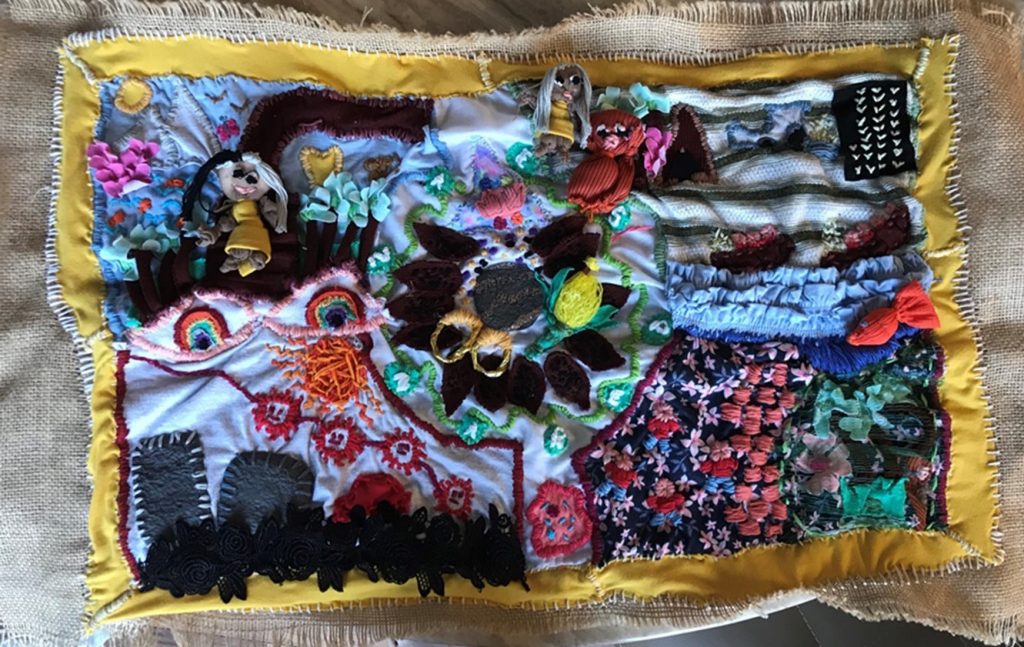This post is part of our Research Initiation Scheme for 2021-2022.
On Friday 10th December 2021, Dr Fiona Clark (Senior Lecturer in Latin American Studies at Queen’s University Belfast) delivered a seminar entitled ‘Sewing Thoughts Together: Pandemic, Texts, and Textiles’ at the 2021-2022 Modern Languages Core Disciplinary Research Group Seminar Series. Dr Clark’s seminar analysed the interactions between art, environmental justice, health and wellbeing, reflecting on how Level 3 students in the Protecting Paradise cursillo (mini-module) have used their personal experiences as inspiration for creative work.

Dr Clark opened up the seminar with an overview of the arpillera, a Chilean textile art form. The word arpillera is used for sackcloth in Spanish. This material was used to package coffee beans, potatoes and flour. From this humble background grew the arpillera textile art form used by Chilean women in the 1970s to capture their experiences of loved ones who were disappeared during the Pinochet dictatorship. Since many of these women were from the poorer end of the social classes in Chile, re-using sackcloth and other materials from around the home (such as school uniforms and old shirts) made this art form accessible and personal through the introduction of materials from the disappeared loved ones. The materials were arranged and sewn together to create an image. Many of these arpilleras reflect on a violent political regime, which Dr Clark later related to the idea of ‘craftivism’: using handcraft as a form of activism. Arpilleras also served as a way to keep alive the memories of loved ones. Dr Clark explained how women would gather together to sew and tell stories. In this way, textiles were used as a way to work through personal trauma and bring communities together.
In addition to studying the arpillera art form, students on the Level 3 cursillo explore the role of text in conscience raising. Students study Tatiana Lobo’s collection of short stories, Tiempo de Claveles. Lobo is a Chilean author who lived in Costa Rica for most of her life. Tiempo de Claveles explores environmental issues in Costa Rica and their effect on campesino and indigenous communities. Dr Clark noted how events linked to the environment that have impacted these communities are often hard for individuals to talk about, so fiction can be used as a tool to not only bring awareness to issues but also to help communities process trauma and suffering. As such, the cursillo emphasises how different art forms, namely text and textiles, are used in preserving memory.
The assessment of the cursillo gives students the opportunity to further reflect on and experience the role of text and textiles in conscience raising and the promotion of well-being. Students can choose to write an essay on Lobo’s short stories or create a project using the arpillera. To create an arpillera, students have to draw on their own personal experiences and repurpose textiles from home. Dr Clark explained how students undertook this assignment during the first lockdown of the Coronavirus pandemic in 2020 and were able to reflect on how they channelled their experiences of health, isolation and uncertainty into their textiles. Student narratives concur with research on the positive effects of textile creation on health in the fields of medicine and occupational therapy. Dr Clark also pointed out the significance of textile work in creating solidarity in communities, considering recent examples of online crochet and knitting groups that were formed during the lockdown to bring communities together.
Having heard my peers in Spanish talking about their participation in Dr Clark’s Level 3 cursillo class, I was very interested to discover the relationship between textiles, social justice and health. I found this seminar to be very insightful as to how we understand and process experiences of health, trauma and injustice. While I do not claim to be an avid ‘craftivist’, Dr Clark’s research caused me to consider how I process and document my own life experiences and events in my community. After over two years of the pandemic, perhaps it is not too late for me to take up knitting!
Report by Sarah Henry, final-year undergraduate in French and Spanish